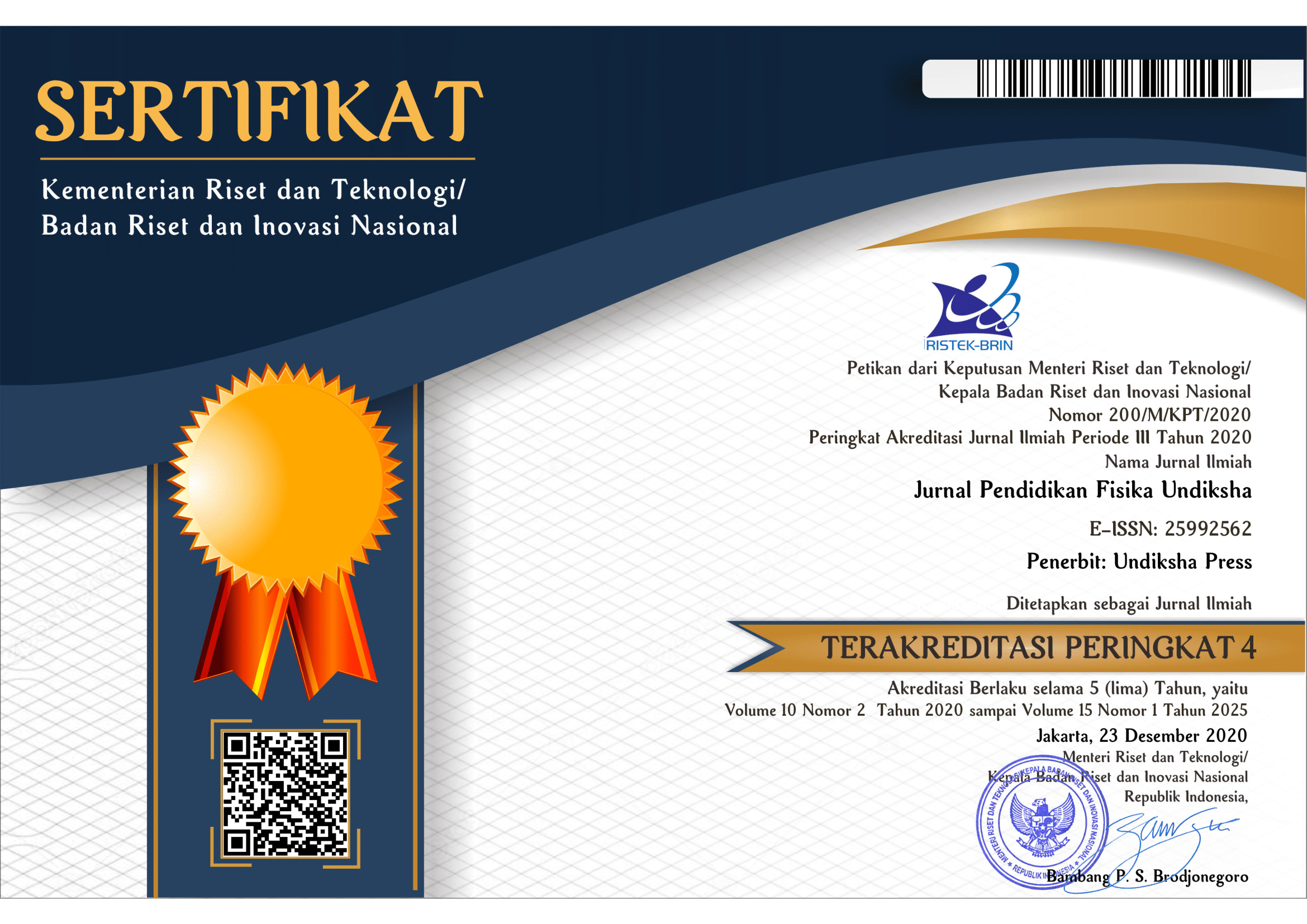Pengaruh Model Pembelajaran Perubahan Konseptual dan Motivasi Epistemik Terhadap Pemahaman Konsep Fisika Siswa Kelas X SMA LAB UNDIKSHA Tahun Ajaran 2013/2014
DOI:
https://doi.org/10.23887/jjpf.v1i1.3604Abstract
Penelitian ini bertujuan: (1) menganalisis perbedaan pemahaman konsep (PK) fisika antara siswa yang belajar dengan model pembelajaran perubahan konseptual (MPPK) dan siswa yang belajar dengan model pembelajaran konvensional (MPK), (2) menganalisis perbedaan pemahaman konsep fisika antara siswa yang memiliki motivasi epistemik tinggi (MET) dan siswa yang memiliki motivasi epistemik rendah (MER), dan (3) menganalisis pengaruh interaktif antara model pembelajaran (MP) dan motivasi epistemik (ME) terhadap pemahaman konsep fisika siswa. Penelitian ini merupakan penelitian eksperimen semu dengan rancangan pretest-posttest non-equivalent control group design. Populasi penelitian ini adalah seluruh siswa kelas X SMA LAB UNDIKSHA tahun pelajaran 2013/2014. Sampel terdiri dari 4 kelas dengan jumlah 64 siswa yang diambil dengan cara simple random sampling. Data ME dikumpulkan dengan menggunakan angket ME dan data PK dikumpulkan dengan 20 butir tes PK. Data dianalisis secara deskriptif dan menggunakan statistik ANAKOVA dua jalur dengan skor pretest sebagai kovariat. Pengujian hipotesis nol dilakukan pada taraf signifikansi 0,05. Hasil penelitian menunjukkan bahwa: 1) Secara deskriptif kelompok MPPK-MET paling unggul dalam pencapaian PK dan penurunan miskonsepsi; (2) Terdapat perbedaan yang signifikan PK antara siswa pada kelompok MPPK dibandingkan MPK (F=17,583; p<0,05). PK siswa pada kelompok MPPK lebih tinggi dibandingkan kelompok MPK; (3) Terdapat perbedaan PK yang signifikan antara siswa pada kelompok MET dan siswa pada kelompok MER (F=28,792; p<0,05). Siswa pada kelompok MET menunjukkan PK lebih tinggi dibandingkan siswa pada kelompok MER; (4) Terdapat pengaruh interaktif antara MP dan ME siswa terhadap PK fisika siswa (F=4,504; p<0,05). PK kelompok MPPK-MET paling unggul dibandingkan kelompok yang lain.Kata Kunci : Model pembelajaran perubahan konseptual, Motivasi epistemik, Pemahaman konsep
This research aimed at: (1) analyzing the difference of Concept Understanding (CU) between students who were taught by using Conceptual Change Model (CCM) and the students who were taught by using Conventional Teaching Model (CTM), (2) analyzing the difference of concept understanding between the students who had high Epistemic Motivation (HEM) and the students who had low Epistemic Motivation (LEM), and (3) analyzing the interaction effect between Teaching Model (TM) and Epistemic Motivation (EM) towards the student’s Concept Understanding (CU). The research was quasi experiment of pretest-posttest non-equivalent control group design. This research population consisted of tenth grade students of SMA LAB UNDIKSHA in academic year 2013/2014. The samples consisted of 64 students in 4 classes and were obtained by using simple random sampling. Data of EM were collected by using epistemic motivation questionnaire, while data of CU were collected by using 20 items of CU test. Data were analyzed descriptively and used ANACOVA of 2 × 2 factorial with using the pretest score as covariate. For testing the null hypothesis, the 0.05 significance level was used. The result of this research shows that. (1) Descriptively, the CCM- HEM group is the most excellent in achieving the CU and decreasing misconception; (2) There is a significant different of CU between the CCM and the CTM groups (F=17.583; p<0.05), where the student’s CU of the CCM group is higher than CTM group; (3) There is a significant different of the CU between HEM group and LEM group(F=28.792; p<0.05), where the student’s CU in the HEM group is higher than in the LEM group; (4) There is an interactive effect between TM and EM towards the student’s CU (F=4.504; p<0.05) where the CU of students in the CCM-HEM group is much better than the other groups.
keyword : Conceptual change model, Epistemic motivation, Conceptual understanding
Published
2014-07-23
Issue
Section
Articles
License

Jurnal Pendidikan Fisika Undiksha is licensed under a Creative Commons Attribution-ShareAlike 4.0 International License.






